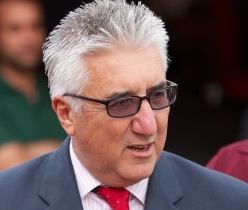
United States Ambassador to Ghana Mr. Gene Cretz says the country’s local content policy in the oil and gas sector may make it difficult to attract the needed foreign capital, technology and expertise.
Mr. Cretz indicated that though the US government is not opposed to Ghana’s proposed local content law, there are problems with the penalties in the law against foreign companies, which could be detrimental to the interests of foreigners.
“As a development partner, the US government is supportive of local content efforts in the hope of developing viable local companies or actors that can do business in Ghana and around the globe,” the Ambassador said.
“We are concerned, however, that Ghana’s local content regulations -- especially in the oil and gas sector -- may make it more difficult for them to continue being the regional leader in attracting the best source of foreign capital, technology and expertise.”
Ambassador Cretz was addressing a media conference in Accra on trade and investment opportunities between US businesses and their Ghanaian counterparts.
Other US officials at the discussion included Mr. Joel Wiegert, Economic Counsellor; Mr Paul Taylor, Senior Commercial Officer; and Mr. Kurt Seifarth, Agricultural Counsellor.
The deliberation, which focused on U.S economic and trade policy towards Ghana, emphasised how the US team works to encourage investment and two-way trade with Ghana.
“For us, maximising the benefit of local content is not the same as maximising local value- addition, and we will continue to dialogue with all levels of government on how best to achieve commendable local content objectives,” he said.
President John Mahama has already approved a proposal to send a legislative instrument to Parliament for the passage of a Local Content Policy in the petroleum industry.
The key highlights of the policy include: that priority should be given to Ghanaians in the granting of licences and agreements in the petroleum sector in all operations; where foreigners want to be involved, they must partner with Ghanaians -- who should carry at least a five percent equity interest that is reviewable at the pleasure of the Minister given certain circumstances.
Also, there is an elaborate reporting procedure that requires the companies to use local services and products manufactured by Ghanaian companies. They must also make investments in research and carry out programmes aimed at technology transfer to Ghanaians.
The country discovered oil in 2007 and commercial oil production began in 2010.
Commenting on the economy and other issues, Mr. Cretz said vulnerabilities remain a major challenge as the country is striving to become an established middle-income economy by 2020.
“In 2013, Ghana remains highly dependent on the export of primary commodities such as gold, cocoa and oil, and also faces significant infrastructure challenges,” he said.
He explained that the effort to lower the deficit from last year’s 12 percent of Gross Domestic Product (G.D.P), coupled with the debt to GDP ratio of 50 percent, have significantly slowed government spending and borrowing.
Government indicated in its 2013 budget that it planned to reduce the budget deficit from last year’s 12 percent of GDP to 9 percent of GDP this year.
Mr. Cretz explained that President Barack Obama’s Partnership for Growth Initiative, Power Africa Initiative, and the Millennium Challenge Corporation programme focus on developing the private sector and public solutions needed to overcome challenges in the power sector.
These challenges will be viewed as opportunities for companies, he said, adding: “We look forward to continuing our effort to make sure that we bring American solutions to bear on these challenges.”
Mr. Cretz stated that Ghana is beginning to serve as a US trade hub for the rest of the West African sub-region, and that a number of American businesses including General Electric (GE) and Halliburton have set up their bases for operations in the country.